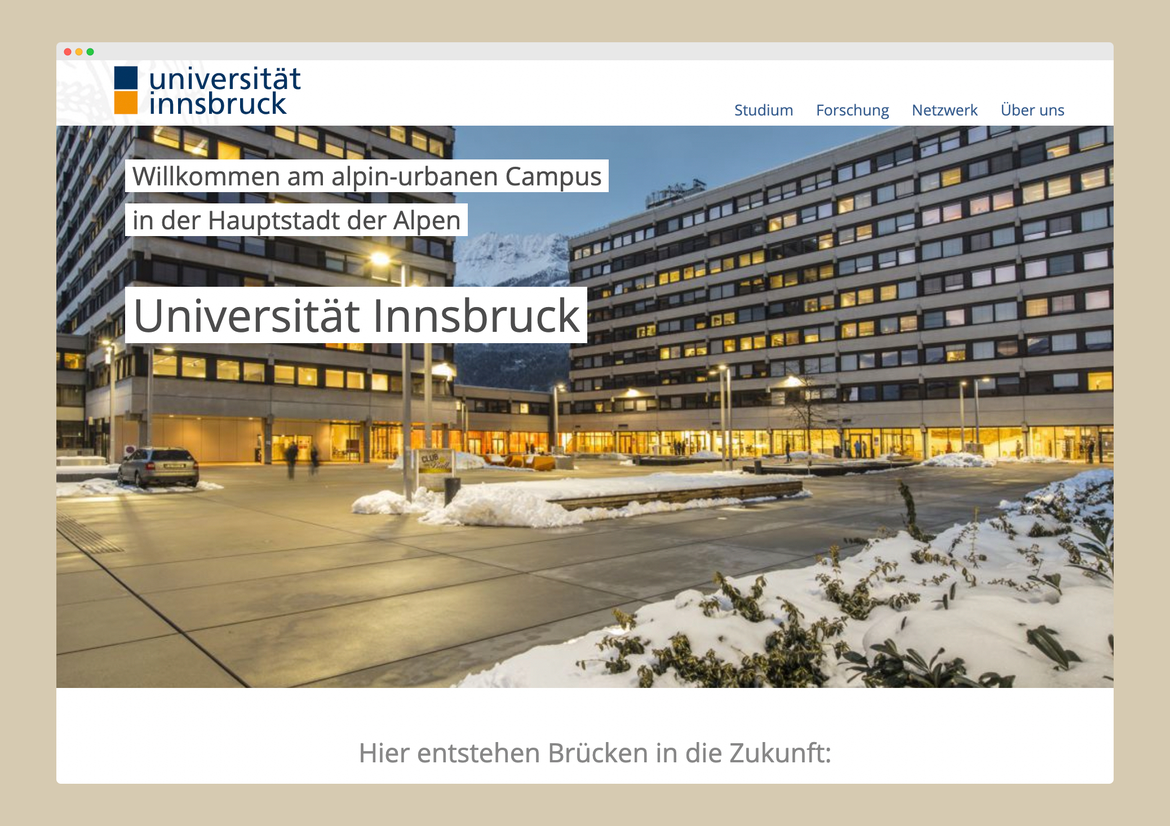Content: University of Innsbruck
University of Innsbruck
Migrating from a 20 years old in-house Content Management System with almost 100k web pages to django CMS

The University of Innsbruck is a public institution with more than 350 years of history. With its approximately 28,000 students and 3,400 academic staff, it is one of the largest universities in Austria.
For about 20 years the website of the university with its sixteen faculties and over 80 departments had been served by a content management system developed in-house; the system was not quite as old as the University, but technologically, definitely a relic from another time.
It was therefore not surprising that the decision was made to replace the old content management system with a more modern and, above all, sustainable CMS solution that would last for decades to come.
The challenge
The biggest challenge was the sheer size and scope of the project. Over the years, a huge labyrinth of almost 100,000 websites had been created. To prevent further uncontrolled growth, a solution had to be found that was capable of providing centrally-managed institutional oversight. It would need to be able to handle the needs of approximately 300 different departments and their respective websites, while still taking into account requirements such as custom navigation and multiple feeds.
What was done
Before the migration to a new CMS could begin, it was first necessary to evaluate which content management system was up to these challenges.
Since Python plays an important role at the University of Innsbruck and is widely used there (as it generally is in the higher education landscape), this became an important criterion for selection of a CMS. Another factor was the economic aspect. In a project of this scale, costs can quickly get out of hand. Thus, it was clear that an open source CMS was the most cost-effective solution. In addition to the programming language and cost savings, the possibility of implementing accessible websites, as well as full control over templating, also played a very important role in the evaluation of the CMS.
For all these requirements, django CMS was the perfect choice. It is open source and based on the Django framework, which in turn is created in Python programming.
Implementation
- To ensure that the look and feel of the site would be maintained identical when transferring the University's CI to django CMS, page and component layouts were defined by using Patternlab. This allowed for the clear separation of concern in the workflows of developers and designers and minor adjustments in the SCSS to be easily made across the board, since the SCSS files were shared with the CMS.
- To provide full-text search all content had to be broken down into its individual parts, typified, and then indexed separately in order to map the same structure on elasticsearch.
- The entire page tree was rebuilt in django CMS with the content from the old CMS to test and recreate the menu structure.
- In order to provide better management of the page content tree of 93,000 items, some custom code was developed as a drop-in-replacement for django CMS’s default handler, allowing each department of the University to manage its own tree of pages more efficiently.
Results
django CMS fitted seamlessly into the University's development environment and was easy to extend with custom applications. In addition, the many editors using the system were provided with a system that allowed them great flexibility to build and develop content, while remaining within the standards and requirements of the University's corporate identity.
With the migration of the first website to django CMS, the University of Innsbruck was finally able to regain the oversight it needed over its website infrastructure and is now continuing the step-by-step migration of department websites. The complete roll out is planned for the beginning of 2022.
django CMS introduced a number of other improvements, including:
- modern UI
- clear page structure
- mature and well-supported open-source solution, with a large community of expertise and skilled professionals
- modern templating language (Django templates vs XSLT)
Packages and libraries:
- django CMS
- Elasticsearch DSL
- djangocms-cascade
- django-sekizai
- django-sass-processor
- django-filer
- bleach
- Pyhyphen
“After using a CMS software developed in-house for almost 20 years the launch of a new CMS is a major step for our organization. django CMS will provide us with a modern and flexible setup to support web pages of a wide range of customers in our organization.” - Christian Flatz, Public Relations Office, University of Innsbruck
Do you want to learn more about this migration project? Join our slack channel www.django-cms.org/slack or reach out to us via [email protected]
Client
University of Innsbruck
Size
28k Students, 3.6k faculty, 1.5k staff
Location (HQ)
Innsbruck, Austria
Industry
Higher Education
Year of launch
2021
Visit Website
Done by
Universität Innsbruck
Büro für Öffentlichkeitsarbeit
Josef-Moeller-Haus, Innrain 52c,
6020 Innsbruck, Austria